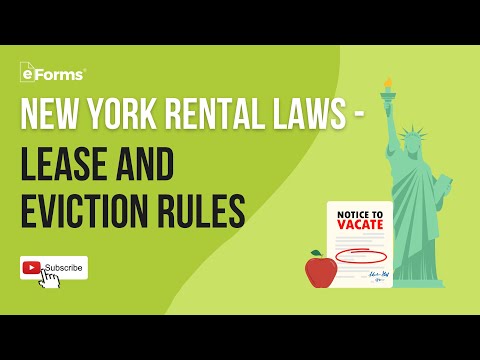
Understanding Landlord Tenant Laws in New York State: A Comprehensive Guide
Welcome to this informative article on understanding landlord tenant laws in New York State. Whether you are a tenant or a landlord, it is essential to have a clear understanding of the legal rights and responsibilities that govern the landlord-tenant relationship. This guide aims to provide you with a comprehensive overview of the key concepts and regulations in this area of law.
Before we delve into the details, it is important to note that while this article is meant to be informative, it should not be considered as legal advice. Landlord tenant laws can vary and are subject to change, so it is always advisable to cross-reference information with other reliable sources or seek guidance from legal professionals.
📋 Content in this article
Now, let’s begin our exploration of landlord tenant laws in New York State.
Understanding Landlord Restrictions in New York
Understanding Landlord Tenant Laws in New York State: A Comprehensive Guide
Renting a property is a common practice in New York State, and as a tenant or a landlord, it is essential to understand the laws and regulations that govern these relationships. This comprehensive guide aims to provide you with a clear understanding of landlord tenant laws in New York, focusing on the restrictions that landlords must adhere to when renting out their properties.
1. Security Deposits: Landlords in New York State are allowed to collect a security deposit from tenants as a form of protection against potential damages or unpaid rent. However, there are restrictions on the amount that can be collected. In most cases, the security deposit cannot exceed one month’s rent.
2. Rent Increases: Landlords have the right to increase rent, but there are limitations on how and when they can do so. In New York State, rent stabilization laws protect tenants in certain buildings from excessive rent hikes. These laws apply to buildings with six or more units built before 1974 in New York City and other select municipalities. Rent increases in these buildings are regulated by the Rent Guidelines Board.
3. Repairs and Maintenance: Landlords in New York have a legal obligation to maintain their rental properties in a habitable condition. This means that they must ensure that the premises are safe, clean, and fit for occupancy. Landlords are responsible for repairing any structural defects, plumbing issues, or problems with heating and electricity.
4. Discrimination: Landlords are prohibited from discriminating against potential tenants based on protected characteristics such as race, color, religion, sex, national origin, disability, or familial status. It is illegal to deny someone housing or treat them differently because of these factors. The Fair Housing Act protects tenants from discrimination at both the federal and state levels.
5. Evictions: Evictions are a complex legal process and must be carried out in accordance
Understanding Your Rights as a Tenant in New York
Understanding Landlord Tenant Laws in New York State: A Comprehensive Guide
As a tenant in New York State, it is important to understand your rights and responsibilities under the landlord-tenant laws. These laws are in place to protect you and ensure that you have a safe and habitable living environment. This comprehensive guide will provide you with a detailed overview of key aspects of landlord-tenant laws in New York State.
1. Lease Agreements:
2. Security Deposits:
3. Repairs and Maintenance:
Title: Understanding Landlord Tenant Laws in New York State: A Comprehensive Guide
Introduction:
In the dynamic world of real estate, it is crucial for landlords and tenants to have a solid understanding of the landlord-tenant laws in their respective states. This article aims to provide a comprehensive guide to understanding landlord-tenant laws specifically in New York State. However, it is important to note that laws can change over time, so readers are encouraged to verify and cross-reference the information presented here with current statutes and legal resources.
Importance of Staying Current on Landlord-Tenant Laws:
Staying current with landlord-tenant laws ensures that both landlords and tenants are aware of their rights and responsibilities. Ignorance of the law is not an excuse, and violations can lead to legal disputes, penalties, and financial repercussions. By familiarizing themselves with the latest laws, parties involved can proactively prevent conflicts, protect their interests, and maintain a mutually beneficial relationship.
Key Components of New York State Landlord-Tenant Laws:
1. Lease Agreements:
Lease agreements are legally binding contracts that outline the terms and conditions of the rental agreement between the landlord and tenant. It is crucial for both parties to carefully review and understand the terms stipulated in the lease. Important elements typically addressed include rent amounts, security deposits, lease duration, maintenance responsibilities, and termination procedures.
2. Rent Control and Stabilization:
Certain areas within New York State may have rent control or rent stabilization laws in place. These laws regulate rent increases and provide additional protections for tenants. Understanding the specific regulations applicable in a particular area is crucial for both landlords and tenants.
3. Security Deposits:
Landlords often require tenants to provide a security deposit before moving in. New York State has specific laws governing security deposits, including limits on the amount that can be charged and requirements for its return at the end of the tenancy. It is important for both parties to understand these laws to avoid disputes over security deposit deductions or returns.
